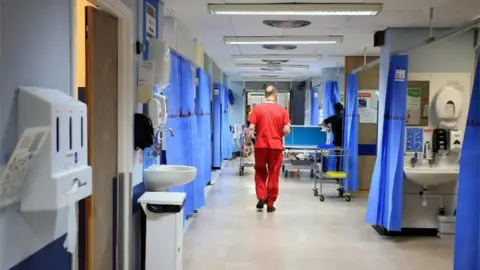NHS data strategy: Hancock defends data sharing plan
 PA Media
PA MediaNHS patients in England will get greater control over their health and social care data under plans set out by the government, Matt Hancock says.
It means people will be able to access their medical records from different parts of the NHS through various apps.
However critics are worried that data could be misused and the system has not been properly explained to patients.
In defending the plan, the health secretary said more effective use of data would deliver better patient care.
The new strategy, called Data Saves Lives, will give patients confidence that health and care staff have up-to-date information enabling them to make quicker, more informed decisions, the government said.
The Department of Health and Social Care (DHSC) said that improving data collection would mean staff spent less time looking for information and more time treating patients.
Patients will be able to manage appointments, refill medications and speak with health staff when needed via apps, it said.
More than two million people use the NHS app, which includes a person's Covid vaccination status and gives access to some services.
"The pandemic has taught us we must be bold and the great strides we have made on vaccines and treatments during this time have been made possible by the way we use data," Matt Hancock said.
Mr Hancock said the use of dexamethasone to treat Covid had been discovered thanks to the use of data within the NHS and had gone on to save "over a million lives" around the world.
"The goal here and what I am determined to do, is to have trusted research environments which protect people's privacy whilst also allowing for us to get insights out of the data which saves lives," he told BBC Radio 4's Today programme.

Analysis: NHS data of huge value
By Chris Vallance, BBC technology reporter
The first three words of the new draft data strategy are "Data Saves Lives" - three words we are likely to hear repeated as ministers promote these plans.
Data, we are told, was a vital resource in tackling the pandemic, and now there is an opportunity to build on that momentum.
From the use of algorithms to predict who might be at greater risk from coronavirus, to the use of artificial intelligence to help analyse the brain scans of acute stroke patients, the document lists plenty of examples of what we might gain.
The data resources of the NHS are potentially of huge value to research. But they also paint a rich and comprehensive picture of our lives.
And privacy campaigners are already concerned about what may be buried in the small print.

As part of the strategy the DHSC says it will introduce legislation to "enable the proportionate sharing of data".
But Cori Crider, co-founder of Foxglove, which campaigns to stop abuse of digital technology, said the government took a "collect it all first and ask questions later" approach when it came to GP data and said the strategy included potential commercial uses of information.
She told the Today programme that GP data was "possibly the most valuable" set of health information in the world and called for the DHSC to send a consent form to individuals offering them the chance to opt out.
Ms Crider said that, while there were some positives in the strategy, people should be offered the option to opt out of specific uses of their data while allowing others.
Mr Hancock said he thought consent should be at the heart of the strategy and believed the vast majority of people would be willing to share their data if there was a "strong mission and purpose" behind the use of data.
Phil Booth, of advocacy group MedConfidential, said the draft strategy had not "changed much" and many of the ideas were similar to the scrapped Care.data plan from 2014.
He said: "The biggest single issue is trust and unless the government gets this right they are going to collapse trust again."
Mr Booth said the doctor-patient relationship was vital and confidentiality was an important part of that. He said if people thought their data was being sold to commercial entities they may not want to tell their doctor some things.
He said the government had become "drunk on data" during the pandemic - with people more willing to allow their information to be used for medical research.
But he suggested two factors which made people less keen to share their data were if it was taken without their permission or if a commercial entity was involved.
Earlier this month, the creation of a central digital database using GP records in England was pushed back, amid concerns that patients needed more time to understand the system.
Matthew Gould, chief executive of NHSX - the unit responsible for setting policy for the use of data and technology in the NHS - said patients needed to "own their data", have access to it and have confidence on how the NHS was handling it on their behalf.
The proposals also include using data to analyse trends in the health of the nation, which the DHSC said could help improve commissioning and planning of services.
The DHSC said that the NHS was committed to using data lawfully and holding it securely.
The strategy has been published in draft form ahead of engagement with the sector over the summer, the DHSC said.

- HEROIN, SAILORS, SPOOKS AND LIES: The thrilling story behind an international drug plot
- TWAYNA MAYNE: Hilarious stand-up exploring gender and sexuality in a quest to understand her Black British identity

